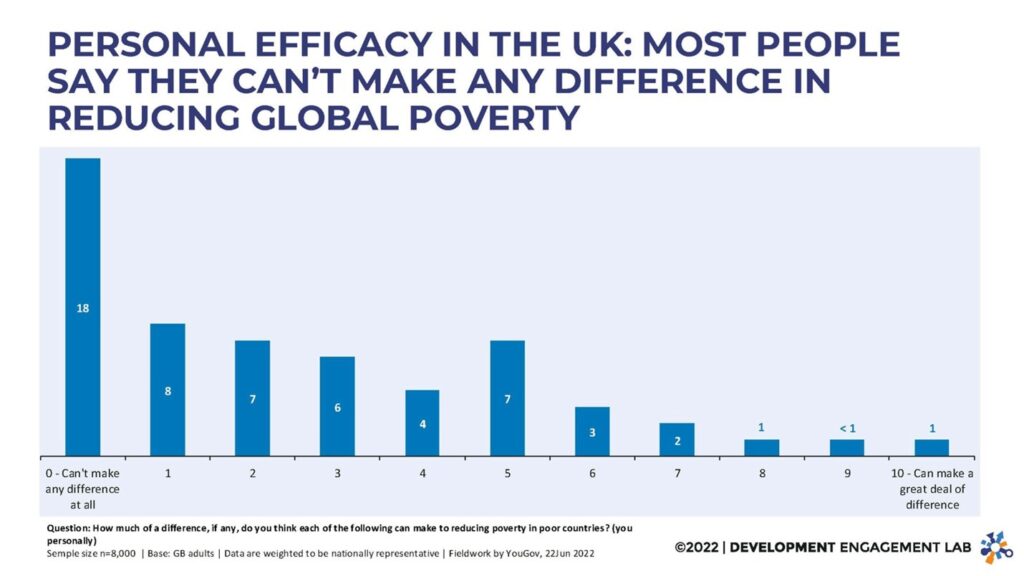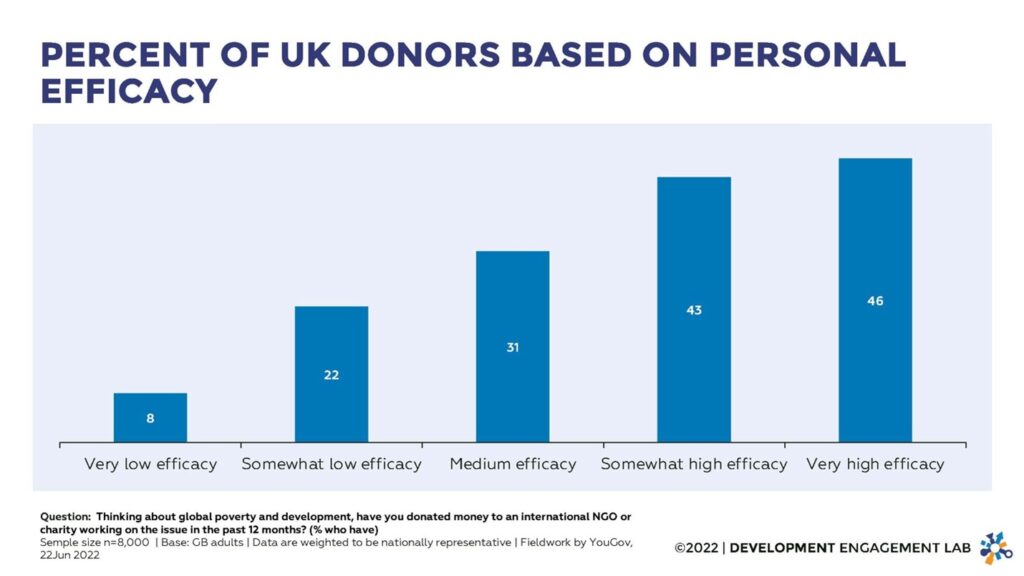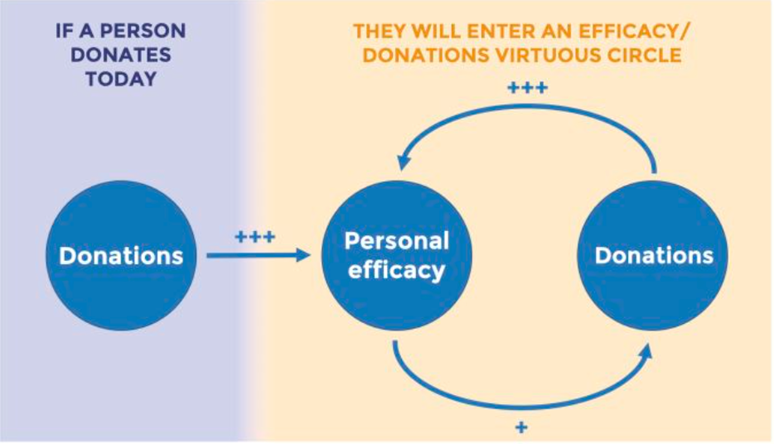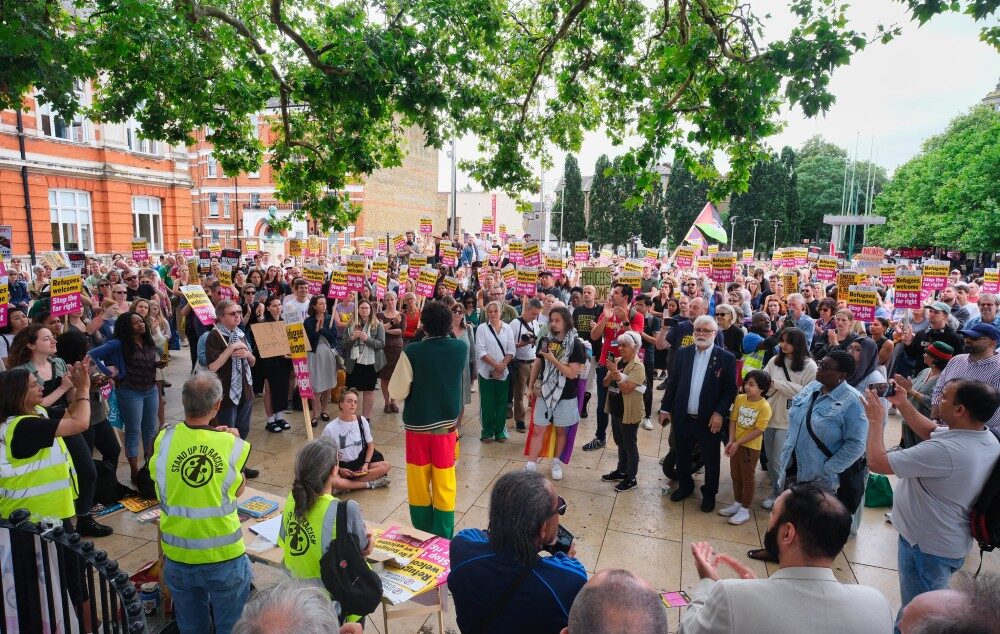Making a difference to global poverty: can the public believe in themselves?
The success of any charity appeal depends on its ability to tap into a person’s belief in their own impact.
But where does that belief come from? Can external influences increase or decrease people’s sense that they can make a difference to global poverty, for example? And when it comes to the general public, specifically in the UK, where has that belief in our impact gone, and can it be brought back?
At the Development Engagement Lab (DEL), we track people’s belief in their impact (otherwise known as efficacy) to better understand its relationship to an individual’s support for and engagement with global issues. This includes a person’s likelihood of donating to charity appeals, but also of seeking out news or information about an issue, signing a petition, volunteering, sharing or speaking to others or otherwise getting involved.
On 26 September, in a webinar hosted by Bond, we’ll share the latest results from an experiment we conducted testing sources of personal efficacy and how it can be sustained, increased or decreased by external actors, such as charities and the government.
Ahead of the webinar, here’s what we already know about efficacy.
Personal efficacy in the UK: what we know so far
- The UK public has particularly low personal efficacy. People in the UK feel unempowered when it comes to making a difference to global poverty. There’s some evidence that suggests the development sector’s heavy reliance on depictions of extreme suffering in past appeals has led to widespread public desensitisation and a perceived lack of progress. This has been compounded by the media routinely taking aim at perceived waste and fraud in government aid spending. As a result, the sector and the UK public have struggled to bounce back when it comes to trust and perceived impact.

- When people have higher efficacy they are more likely to both support international cooperation and get involved with related causes, for example by donating. In a survey of 8,000 UK adults conducted in September 2021, only 19% of participants reported donating to a development NGO in the previous year. Those who say they can’t make any difference in reducing global poverty are by far the largest group in the UK. Among those, only 1 in 20 had donated to development causes in the previous year.

- There is an efficacy ‘virtuous cycle’ when it comes to taking action, for example by donating. When a person donates, their efficacy increases, and this increases the likelihood that they will donate again in the future.

- Donating is a more powerful driver of efficacy than increasing efficacy is of driving donations, and we suspect this is true of other actions. In other words, tactics to increase efficacy work, but the act of donating does more to increase an individual’s belief in their own impact than any tactic. This is not to say those tactics aren’t worthwhile. In a 2021 study, DEL found that if a person who believes they cannot make any difference whatsoever is convinced that they can make a great deal of difference, the likelihood that they will donate jumps from 17% to 44%.
- Stories of impact, progress and empowerment are strong drivers of efficacy. We have both qualitative and quantitative data from our research, as well as anecdotal evidence from partners in the sector, which shows that consuming stories of progress improves efficacy. We’ve seen and tested such stories in the form of ‘check-in’ or ‘thank you’ campaigns, both with and without a financial ask, as well as through unconventional efforts to raise awareness and demystify the donor/recipient relationship. Making these efforts a permanent part of organisations’ public-facing activities remains challenging. The main barrier seems to lie in reconciling fundraising needs with the importance of long-term efficacy repair, particularly for smaller organisations. For us, the long-term decline in donations in the UK is enough to suggest the need for a step-change, but it’s up to organisations – namely leadership and insight teams – to develop an internal case for institutional shifts.
Join our efficacy webinar to hear more
During the webinar on 26 September, we’ll dig deeper into the mechanisms by which efficacy is created, maintained, decreased and restored. We’ll also examine the results from our experiment, testing how external actors – like the government, NGOs and advocacy organisations – can impact efficacy. We’ll ask how hearing about the importance of their support affects an individual’s understanding of their own potential impact. We’ll also share examples of partners who are doing this work with the public.
We are keen to hear ideas from the sector about how to make sharing progress and impact stories part of wider practices to improve public engagement with aid and international cooperation. Join us!
Category
News & views
